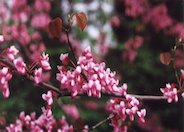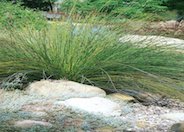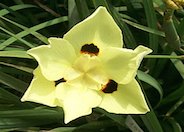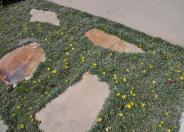
Common name:Eastern Redbud
Botanical name:Cercis canadensis
This small, deciduous tree with a rounded head is covered with small flowers of a rose pink color in the spring before the appearance of heart-shaped leaves. It can grow to 25' tall with an equal spread. It has a low branching habit with a rounded form. Leaves turn yellow green in the fall.

Common name:Cape Rush
Botanical name:Chondropetalum tectorum
Chondropetalum tectorum has 3'-4' tall stems that shoot out in all directions from the roots. Each stem has papery bracts connected to the ends that turn from tan to dark drown, then fall off. Chondropetalum can grow in marshes, in the ground with regular watering, or in drought conditions.

Common name:Creeping Fig
Botanical name:Ficus pumila
This is one of the few plants that can attach itself securely to wood, masonry, or metal. Because there is no limit to its size, it can overcome an entire buliding. It is most often found in colder climates. This vine will not climb on the south or west walls.

Common name:Yellow Moraea, Fortnight Lily
Botanical name:Dietes bicolor
This clumping perennial Iris relative stands 3'-4' high. It has light yellow, iris-like flowers with maroon blotches that are about 2" wide. It performs best in full sun and in soil with good drainage.

Common name:Dymondia, Rock Ditty
Botanical name:Dymondia margaretae
This foliage is gray/green/silvery; it is a very dense, mat forming groundcover. It tolerates drought, cold, salt spray and poor soils. It's deep rooted and produces small, inconspicuous yellow flowers. Rock Ditty is great for use in between stepping stones or pavers.
| Designer: Unknown | Garden Two 1 |
Photographer: GardenSoft |
Soils and Compost:
Maintain a two to four inch layer of mulch on the soil surface to reduce weeds, infiltrate rain water, and reduce compaction.
Integrated Pest Management:
Remove irrigation water and fertilizer from areas where you don't want weeds to grow.
